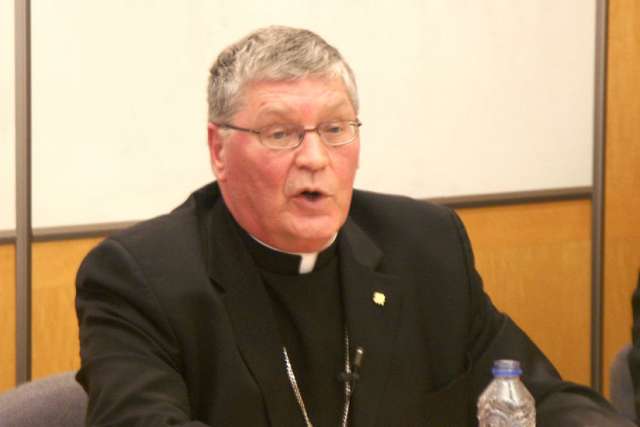For what reason? It was not for lack of news. My first ever visit to Newfoundland coincided with a number of major stories. There was the inaugural budget of the new Liberal government, which raised taxes on everything that moved, cut services and still booked a whopping $1.8 billion deficit (more than 20 per cent of total government spending). The Liberals will take the heat, but it was the Progressive Conservatives in power from 2003-2015 who deserve the blame, having squandered the oil boom. Then there was the resignation of the CEO of Nalcor, along with the entire board of directors. Nalcor is the Newfoundland crown corporation established in 2007 to manage the province’s energy industry. And for good measure, St. John’s was hit with the worst April storm in its history — 49 cm of snow and howling winds that rendered the city impassable. If a visitor needed reminding that Newfoundland really is in the middle of the north Atlantic, closer to Iceland than to Vancouver Island, the “spring” storm was sufficient.
So with all that going on, why were Catholic matters on the front page? It was coverage of the Mount Cashel trial. Yes, more than 25 years after the revelations of the horrific abuse at the Irish Christian Brothers orphanage, it is in the courts again. The Christian Brothers in Canada have long since been liquidated, the government of Newfoundland has paid compensation to the victims, the Mount Cashel building itself has been torn down and a supermarket built on the site — but there is a new trial. A civil trial, a test case brought on behalf of victims, charging that the Archdiocese of St. John’s itself should be held “vicariously liable” for the abuse at the orphanage, even though it was not an archdiocesan entity, either according to civil law or canon law. The trial will resume hearing testimony in June.
That was in the background for the Catholics who gathered at the Knights of Columbus hall in St. John’s for a dinner in support of Catholic Christian Outreach. I was in town with the founder, Andre Regnier, to express our gratitude for the support our CCO team at Memorial University of Newfoundland (MUN) had received in its first year on campus, and to encourage local Catholics to continue that support for Eric Filion and our team of full-time missionaries on campus.
My visit here meant that I have now travelled literally from coast to coast to support CCO missionaries and our students, which I am delighted to do because, as I never tire of saying, it is one of the most hopeful developments in the Church in Canada. In the Easter season, when the Church’s liturgy takes us through the Acts of the Apostles, it is impossible not to see that same missionary spirit at work on Canadian campuses today in the work of CCO.
Yet I was not expecting what I heard from local Catholics, how the arrival of CCO at MUN was not only a sign of hope, but, despite the weather, a sign of spring after a very long winter.
“It’s the only sign of hope I have seen here for 60 years,” one prominent local citizen told me. Even allowing for a touch of hyperbole, that statement brought me up short. And I heard many others like it, even if less dramatically put.
Archbishop Martin Currie, instrumental in bringing CCO to St. John’s, spoke of how the Catholic mission at MUN had been in need of evangelical energy. Now, there is an assigned chaplain, Fr. Joseph Mroz, S.J., who is on campus and offers Holy Mass daily, something that hasn’t happened in a great many years. With the archbishop’s support, Fr. Mroz’s leadership and the experience and energy of the CCO missionaries, Catholic students at MUN are proving again to be signs of hope for the archdiocese. Given that MUN attracts an unusually large proportion of international students, the seeds planted on the Rock will bear fruit in faraway corners of the vineyard. The MUN Catholic club’s executive for next year includes a young man from El Salvador and a young woman from Nigeria.
The Mount Cashel trial is about the past, but the pain of the past is still present, as well as a lingering sense that perhaps the vitality of the Church — nowhere more evident than in the grand basilica of St. John the Baptist overlooking the harbour — also belongs to the past. The good news at MUN will not change all of that, but in a small measure hope has been planted.
As it was my first visit, I headed out to Cape Spear, the easternmost point of North America, where the fierce winds made even a brief visit seem long. Yet I thought we should pray there, and suggested Eric Filion lead Andre and I in praying Psalm 72 — “He shall have dominion from sea to sea” — from which the Dominion of Canada got its original name, and which remains to this day as our national motto. It was moving to pray that here amidst the buffeting, frigid blasts. The Church knows well the harsh winds that toss her about on the cold seas. Yet it is the Lord whose dominion continues, and from this coast to the other, my young friends in CCO are doing their part to strengthen His dominion in our land.
(Fr. de Souza is the editor-in-chief of Convivium, a Canadian magazine of faith in our common life: www.conviviummagazine.ca.)


